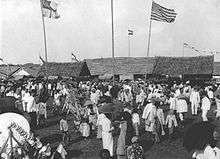Pasar malam
Pasar malam (Dutch: Nacht Markt or Avondmarkt) is an Indonesian and Malay word that literally means "night market" (the word comes from bazaar in Persian[1][2]). A pasar malam is a street market in Indonesia, Malaysia, Brunei and Singapore that opens in the evening, usually in residential neighbourhoods.[3]
It brings together a collection of stalls that usually sell goods such as fruits, vegetables, snacks, toys, clothes, shoes, alarm clocks, and ornaments at cheap or at least reasonable prices. Unauthorized copies of DVDs, CDs and computer software are often sold at a pasar malam. A pasar malam often takes place only one to a few days of the week, as the traders rotate around different neighbourhoods on different days of the week. Haggling over prices is a common practice at such markets.
History

In Indonesian archipelago, markets are traditionally held in different days with locations rotating among participating villages. This traditional economic custom is known as Hari Pasaran (lit. "market days") in Javanese. After being further developed, market was established more permanently like it is today. The night market is regarded as the continuation of this non-permanent market culture. Night market are usually held during special occasion or festival, such as Sekaten festival in Java, or held in Ramadhan nights, approximately a week before Lebaran.
After the discovery of electricity and lightbulb, the night markets were held more frequently in colonial Dutch East Indies in early 20th century. The most notable one is Pasar Gambir, a night market fair held in 1906 and yearly from 1921 until the outbreak of World War II in 1942, in the Koningsplein, Batavia, Dutch East Indies (now Merdeka Square, Jakarta, Indonesia) to celebrate the birthday of Queen Wilhelmina of the Netherlands. It has become the predecessor of the annual Jakarta Fair and Den Haag's Tong Tong Fair which are actually a night market and festival held for several weeks.
Indonesia
In Java, especially in the Javanese royal cities Yogyakarta and Surakarta, the grand week-long pasar malam is usually held annually during the Sekaten festival to celebrate Mawlid or the birthday of prophet Muhammad. During colonial Dutch East Indies the annual Pasar Malam was held in Pasar Gambir (today Merdeka square) and become the predecessor of modern Jakarta's annual Jakarta Fair.
Today, several kecamatan (district) in Jakarta and also other provinces in Indonesia, hold weekly pasar malam, usually every Saturday night in a nearby alun-alun square, open fields or marketplaces. In Indonesia, pasar malam has become a weekly recreational place for local families. Other than selling variety of goods and foods, some pasar malam also offer kiddy rides and carnival games, such as mini carousel or mini train ride. In Palembang, a popular pasar malam is located on front of Kuto Besak Fort on the bank of Musi River. This pasar malam sells local dishes and snacks such as pempek, lenggang and tekwan, and also offers souvenirs and handy crafts.[4]
Malaysia and Singapore
In Malaysia, Pasar Malam are often differentiated by ethnicity. A Malay pasar malam will often contain stalls selling Islamic books, kopiah hats, sarongs and other Malay specialty items. A Chinese pasar malam may sell Mah Jong sets, incense, joss sticks, joss paper and various Chinese prayer supplies. An Indian pasar malam may contain Hindu prayer supplies.
In Singapore, food hawkers at pasar malam are required to get a licence from local council to ensure health, cleanliness and to control numbers to avoid traffic congestion. A food handler is required to get a medical checkup and Typhim VI injections,[5][6][7] The pasar malam site is allocated by the local council.[8][9]
The Netherlands
In the Netherlands, a yearly Indo Eurasian festival is held in The Hague under the name Tong Tong Fair, formerly known as the Pasar Malam Besar (besar meaning "big"). Due to the high number of Indo-Eurasians and the successive success of this event since 1959, dozens of pasar malam are held each year in the Netherlands. Recently the Indonesian embassy has started sponsoring a yearly "pasar malam Indonesia", mainly to promote Indonesian business and enhance Dutch-Indonesian relations.[10]
See also
- Hawker centre, open-air complexes in Malaysia and Singapore housing many stalls that sell a variety of inexpensive food
- Kopi tiam, literally a "coffee shop"
- Pasar pagi, (morning market)
- Wet market
References
- ↑ Russell, Jones (2008). Loan-words in Indonesian and Malay. KITLV-Jakarta. ISBN 978-9794617014. Retrieved August 26, 2015.
- ↑ Nigel Phillips, Khaidir Anwar (eds.). "Papers on Indonesian languages and literatures". 13 of Cahier d'Archipel. Indonesian Etymological Project, School of Oriental and African Studies, University of London, 1981: 63. ISBN 978-0950747408. Retrieved August 25, 2015.
- ↑ malaysiasite.nl
- ↑ "Pasar Malam Sungai Musi, Representasi Kearifan Lokal Palembang". Indonesia Kaya (in Indonesian).
- ↑ Street Foods, By Artemis P. Simopoulos
- ↑ (Malay) SYARAT-SYARAT PENIAGA SEMENTARA DI PUTRAJAYA.
- ↑ [(Malay) https://books.google.com/books?id=H11l8zerTQ8C&pg=PA121&lpg=PA121&dq=peniaga+perlu+mendapatkan+suntikan&source=bl&ots=8eJP34oLKn&sig=n_eBsaoO4a6JEaWJdF7diyGTQik&hl=en&sa=X&ei=gMkNUefTEYz9rAe5mYGYCw&ved=0CGsQ6AEwCA#v=onepage&q=peniaga%20perlu%20mendapatkan%20suntikan&f=false Siri Mula Bisnes: Pasar Malam By Johar Seman]
- ↑ Location maps of Pasar Malam by Selayang Local Council.
- ↑ Location maps of Pasar Malam by Kajang Local Council.
- ↑ The Netherlands has the largest number of pasar malam outside Asia.